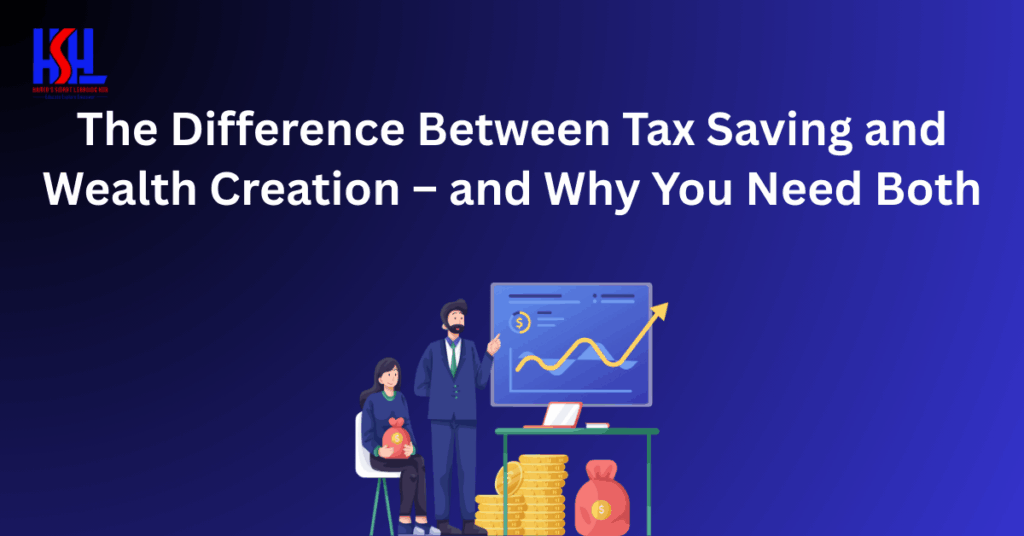The Difference Between Tax Saving and Wealth Creation
By Hamid Ulla Tarafder
When it comes to managing your finances, two common buzzwords dominate the conversation: tax saving and wealth creation. While they may sound similar or even interchangeable, the truth is they serve very different purposes in your financial journey. Understanding the difference between tax saving and wealth creation – and why you need both – is crucial for building a secure and prosperous future.
What is Tax Saving?
Tax saving refers to strategies and investments that reduce your taxable income. In India, the Income Tax Act provides several sections like 80C, 80D, and 10(10D) that allow you to save on taxes through eligible investments and expenses. Some common tax-saving instruments include:
- Public Provident Fund (PPF)
- Employees’ Provident Fund (EPF)
- National Pension Scheme (NPS)
- Tax-saving Fixed Deposits
- ELSS (Equity Linked Saving Scheme)
- Life and Health Insurance Premiums
These options help you lower your immediate tax liability and often come with additional benefits like long-term returns and financial security.
What is Wealth Creation?
Wealth creation is the process of accumulating assets and investments that grow in value over time. The objective here is not immediate savings, but long-term growth. Wealth creation involves:
- Investing in mutual funds and stocks
- Starting a SIP (Systematic Investment Plan)
- Real estate investments
- Building a diversified portfolio
- Gold and digital gold investments
Unlike tax-saving tools, wealth-creation strategies are designed to grow your net worth and provide financial freedom in the future.
Key Differences Between Tax Saving and Wealth Creation
| Aspect | Tax Saving | Wealth Creation |
| Goal | Reduce taxable income | Grow financial assets over time |
| Time Horizon | Short to Medium Term | Long Term |
| Risk Level | Low to Medium | Medium to High |
| Examples | PPF, ELSS, Insurance, NPS | Stocks, Mutual Funds, Real Estate |
| Liquidity | Often locked-in | Flexible depending on asset class |
| Tax Benefits | Yes | Not always |
Why You Need Both
Many people focus only on tax saving because it gives immediate benefits. However, relying solely on tax-saving tools can limit your long-term financial growth. On the other hand, wealth creation without considering tax implications can lead to reduced net returns.
Here’s why you need a balanced approach:
- Tax Saving provides stability: It ensures you’re making the most of government exemptions and deductions.
- Wealth Creation builds future security: It helps you achieve larger financial goals like retirement, buying a house, or children’s education.
- Combined, they create financial synergy: Using ELSS, for instance, allows you to save taxes and grow wealth through equity investments.
How to Strategize
- Start with Tax Saving: Use available exemptions under 80C and 80D to reduce your tax liability.
- Simultaneously focus on Wealth Creation: Don’t just stop at PPF or FDs; invest in SIPs, mutual funds, or ETFs.
- Diversify: Spread your investments across different asset classes to manage risk.
- Get Professional Help: Sometimes, the best approach is to consult a financial expert who can help tailor a plan based on your income, goals, and risk appetite.
At https://hamidssmartlearninghub.com, we help clients not only save taxes smartly but also build long-term wealth through personalized financial planning. Click here to explore our wealth and tax planning services and take your first step toward financial freedom.
Final Thoughts
Both tax saving and wealth creation are essential components of a healthy financial plan. Think of tax saving as your financial defense, and wealth creation as your offense. You need both to win the financial game.
Ready to build a future that’s both secure and prosperous? Book a Free Consultation Today and let us guide you with expert advice tailored to your needs.


